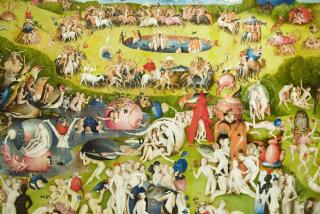‘Office politics is, to some degree, horrifying’ - Ling Ma on her horror-satire ‘Severance’
After Ling Ma got laid off from her office job, she decided to get her revenge by killing almost everyone in the world — in her debut novel, that is. “Severance” follows Candace Chen, one of nine people to survive the outbreak of Shen Fever, a disease that started in China and found its way to the United States.
The disease is an insidious one. It kills some people and turns others into, effectively, zombies — infected and sick, they go through the motions of their everyday routines. Candace and the other survivors, led by a megalomaniac computer programmer named Bob, raid the houses of the dead and infected for supplies, killing the zombies they find.
Published this month by Farrar, Straus and Giroux, “Severance” goes back and forth in time, before and after the epidemic. In her old life, Candace, a millennial who moved to the U.S. from China as a young girl, worked a boring office job at a New York publisher and dated an aspiring writer named Jonathan. In her new life, she and the rest of the plague’s survivors try to make their way to Chicago, where Bob has promised there’s a fortress they can live in.
Ma spoke to The Times via telephone from her home in Chicago.
“Severance” is part post-apocalyptic horror, part office satire. How did you decide to combine those two themes?
I had started working at an office, and office politics is, to some degree, horrifying. [Laughs] For a good part of my life, it was the main horror of my life. The company I worked for was downsizing, and I started writing this book in the last few months of getting laid off. I had only been there for three years; other employees had been there for 30-plus years. So I started writing kind of a fun, apocalyptic short story. I wanted to be destructive in some ways, and fiction can realize a lot of fantasies. I was kind of angry, but I also felt extremely liberated and extremely gleeful at the same time; it was a strange combination of glee and anger at once. That’s kind of the origin of “Severance” — it took me a while to realize that it was actually a novel. After I was laid off from my job, I did an MFA program, and spent four years working on it.
Were you influenced by any horror novels or movies dealing with zombies?
For reference, I definitely watched some of the George Romero films. I was also watching “The Walking Dead” at the time. I haven’t gotten through the whole series; I think I only watched maybe the first two or three seasons. I’ve always been a huge fan of horror, but I’ve never been a huge fan of zombie horror, so it’s strange this is what came out. I love ghost stories, because I feel like they’re essentially psychological stories that you’re trying to unpack. But zombies just seem so dumb and bludgeoning, in some ways. But I was watching a lot of “Walking Dead,” and I was also watching a lot of “Mad Men,” and I think somewhere between “Walking Dead” and “Mad Men,” there was some sort of mash-up. My novel is an approximation between those two TV shows in some way. [Laughs] To be honest, I learned how to plot a novel by watching eight years of “Mad Men.” I just loved how they take certain themes and keep developing them through the seasons, and then cash out on them. There are other shows that I think of as about work shows, like “The Sopranos” and “The X-Files”; those were also big influences.
It’s funny, you don’t hear people talk about “The Sopranos” and “The X-Files” as office shows, but they really are, in a way.
Yeah. I mean, “The Sopranos” is just office politics, but with the stakes heightened so much more. It was strange, because I’d work my little office job, and I would totally relate to Tony Soprano. [Laughs]
In horror movies, zombies are usually the bad guys. But in “Severance,” the opposite is true. How did you come up with the idea of having the humans be the villains, and the zombies be the victims?
I didn’t consciously set out to do that, but I never felt like the zombies were a huge threat in any way. In the novel, the zombies have contracted Shen Fever, and one of the inspirations for Shen Fever was thinking about the nature of factory work, like when Candace goes to Shenzhen and sees [workers] doing assembly-line labor, those repetitive motions, routines that are so bludgeoning. In a way, Shen Fever, which is named after Shenzhen, inflicts that on the rest of the world, and you see that inflicted on New York. And I suppose I wanted the zombies in some way to make more literal what we were going through. [Laughs] So often I worked a job when I have thought to myself, “Add 50 years to this, and I’ll be dead.” Essentially, Shen Fever expedites that process, right? I felt like maybe the zombie narrative was just something to parallel what Candace and other people go through.
Candace’s job involves outsourcing the production of Bibles. Why Bibles?
I thought Bibles were a great entry point to discuss or play around with ideas of consumerism, simply because everyone owns a Bible and yet it’s still the bestselling book of every year. The trick of selling Bibles is, essentially, how do you make consumers buy something they already own? What you do is you repackage it with a different spin. And it’s also a high-labor product, so it has to be made in a place like China or somewhere else with low wages. I thought it was a great way to talk about consumerism and also talk about global capitalism. I wanted to show what global capitalism feels and looks like on the individual scale, and from the point of view of someone who’s not particularly powerful, but who has the perception to see and understand these systems, but also feels powerless to change it or do much of anything about it.
The novel is a satire of capitalism from the point of view of the millennial protagonist, Candace. Do you think that millennials are more critical of capitalism than prior generations have been?
Many of my friends, especially throughout their 20s, lived without health insurance, just to try to be a writer or an artist. There is this feeling of working to live. Technically, I am a millennial, but if I were [a few years older] I’d be Gen-X. I didn’t grow up with the internet until I was maybe 15 and I only got a smartphone a few years ago. But there is, among my friends at least, complete disillusionment with the capitalist system. At the same time, what I will say is that I’m a complete consumer myself. I shop at H&M. [Laughs]
I’m not a millennial but I feel like it must be frustrating to be in these dire economic straits, through no fault of their own, and then see all these clickbait articles with headlines like “Millennials are killing mayonnaise” and that kind of thing.
Most of my friends are in their 30s now, and they’re still trying to pay down their student loans. It’s just frustrating, full stop. And maybe a lot of their concerns kind of condense into Candace Chen.
Candace has to deal with office politics before the apocalypse at her job at the publisher, but also after the apocalypse. She has to deal with Bob, who’s this kind of mansplaining Svengali. Do you think that these power structures that exist are so strong that they’ll still be around even after the apocalypse?
Yeah. Seemingly with apocalyptic narratives, it’s the illusion of the sudden blank slate. The whole slate is wiped clean, you can begin anew, and get it right this time. But what happens in “Severance” is that the old power structures in some way replicate themselves. I see Bob as someone who probably at his old job felt that he didn’t have a lot of power, and when this opportunity comes along, he really makes a grab for it. I think this book does tend to be more pessimistic about that. It’s human nature in some ways. You still have to work, and someone else is going to make you work.
Schaub is a writer in Texas.
More to Read
Sign up for our Book Club newsletter
Get the latest news, events and more from the Los Angeles Times Book Club, and help us get L.A. reading and talking.
You may occasionally receive promotional content from the Los Angeles Times.







